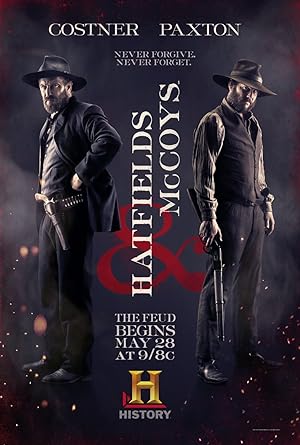Hatfields & McCoys is a 4 hour 50 minutes miniseries about the two families’ conflict starring Kevin Costner and Bill Paxton. Most of the conflict originates soon after the Civil War so Hatfields & McCoys provides a microcosm of how brother can turn brother against brother. If you read Twelve Years a Slave, Solomon Northup concludes that even without the presence of black people, there is an endemic cruelty within the Confederacy that must find out a brutal outlet, which Hatfields & McCoys illustrates.
Hatfields & McCoys uses the regional, class, political and religious disparities between the two families as multiple explanations for the conflict. Alcohol unsurprisingly plays a pivotal role in the violence. There is a neat little scene that shows how the New Jim Crow penal system had its roots in this conflict. Hatfields & McCoys elevates white on white crime to a historically significant event worthy of state intervention as opposed to a group of two criminals that need to be punished by the state. Hatfields & McCoys shows that if the criminals are in control of the state, violence can be retroactively justified and excused. Some of those people directly involved in the conflict rose to power in their respective states of West Virginia and Kentucky. While the families stopped battling each other ages ago, it should still disturb any person depending on fair and impartial government intervention that people who take petty to a whole new level are the ones deciding who is right and wrong and are supposed to do so with no bias. If they did not like each other, and they were literally related, what chance does someone stand outside their clan?
I knew very little about the two warring families before watching Hatfields & McCoys. Depending on the level of skill of the actor on screen, Hatfields & McCoys can be riveting or monotonous. Hatfields & McCoys went to ridiculous lengths to make one part of the conflict into an American Romeo & Juliet scenario, but it becomes less believable when the two are frustratingly not allowed to talk to each other. It seemed contrived to make at least one of the Hatfields more sympathetic though flawed. Hatfields & McCoys seems to favor the Hatfields more by either characterizing their violence as patriotic or self-defense as opposed to pure thuggery until the end whereas the McCoys are seen as violent, vengeful zealots with an evil lawyer.
Costner and Paxton lay a solid foundation of friendship that credibly deteriorates over time. Tom Berenger is unrecognizable as one of the less reasonable Hatfields who possibly exacerbated the tension. It was weird to see Lindsay Pulsipher as a good character. I’m used to her playing Rollins’ bad sister on Law & Order: SVU. There were two actors who really stole the focus of Hatfields & McCoys: Powers Boothe as a Hatfield judge and Andrew Howard as an outlaw turned lawman. I’m still angry that Agents of S.H.I.E.L.D. did not give Boothe more screen time. Howard reminds me of a younger Jeffrey Combs. Jena Malone as a notorious McCoy did great, but after seeing her fearsome turn in The Hunger Games’ movie franchise, I know that they could have given her more.
Hatfields & McCoys is not a must see movie, but for fans of the cast or those interested in a dramatization of the family’s conflict, you may enjoy it.
Stay In The Know
Join my mailing list to get updates about recent reviews, upcoming speaking engagements, and film news.




